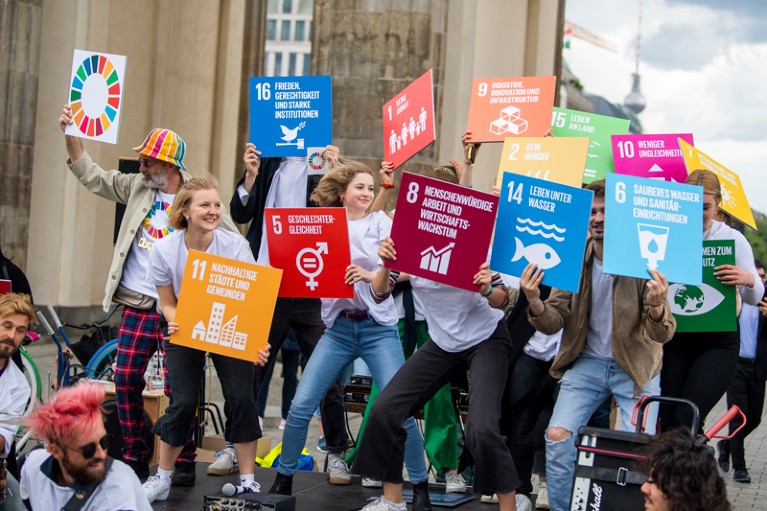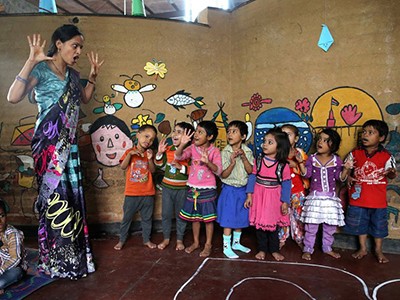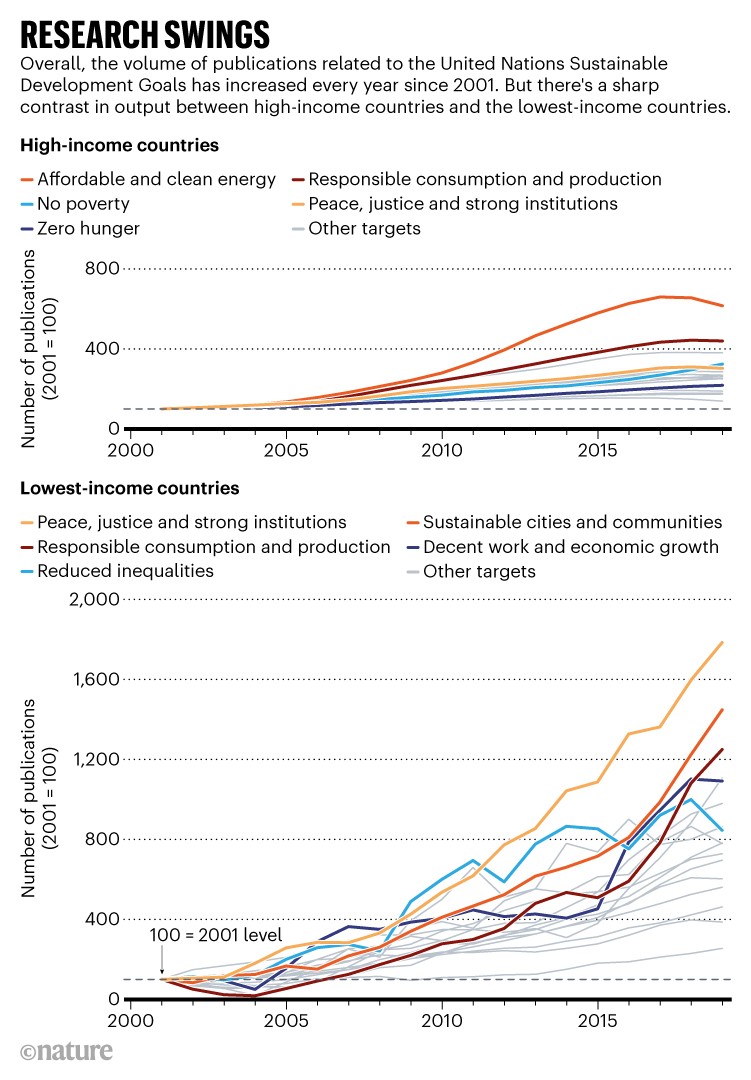
A demonstration in support of the Sustainable Development Goals in Berlin in May. High-income countries are not keeping the promises they made in 2015.Credit: Christophe Gateau/dpa/ZUMA Press
When world leaders committed themselves to the United Nations Sustainable Development Goals (SDGs) in 2015, it felt like a real victory. For the first time, all member states declared that they had a collective responsibility to end poverty and protect the environment — globally and on their home turf.
Those aims might seem like a statement of the obvious. But world leaders had long been reluctant to accept the case for working together for sustainable development. In the richest countries especially, ending poverty was largely seen by many leaders as a matter for international aid. By contrast, many leaders of low- and middle-income countries (LMICs) considered environmental protection as a hindrance to their development. The SDGs — a series of 17 goals to be achieved by 2030 — signalled a change to such attitudes, an acceptance that ending poverty while protecting the environment is a shared responsibility.
Halfway to 2030, and things are not looking good. A target to get all children into primary schools and another to eliminate preventable deaths among newborns and under-fives are the closest to being met. But the COVID-19 pandemic has put even these out of reach.
Get the Sustainable Development Goals back on track
There are many reasons for this failure, not least, a failure to adjust institutions of science and governance to meet the SDGs. Success requires the SDGs to be a top-level priority for all departments of government and especially ministries of finance — something that is all too rare. At the same time, research is key to knowing how to make the SDGs work. The failure so far to make progress is also a failure of the institutions of science, and especially funding agencies.
In the rich-world countries that are largely responsible for the bulk of anthropogenic climate emissions and loss of biodiversity, funding agencies and universities often talk about the necessity of meeting the SDGs. But a report by an international team of authors, led by researchers at the University of Sussex in Brighton, UK, University College London and the United Nations Development Programme based in New York City, shows that there is still a long way to go before policy and funding systems make the SDGs more of a priority for researchers.
According to Changing Directions: Steering Science, Technology and Innovation Towards the Sustainable Development Goals, since 2015 the rate at which research from high-income countries on, or about, the SDGs is being published has mostly either plateaued or is falling (see ‘Research swings’). It is continuing to increase for just 4 of the 17 goals: goal 1, no poverty; goal 2, zero hunger; goal 5, gender equality; and goal 10, reducing inequality. Research on goal 7, affordable and clean energy, has taken a sharp downturn since the pandemic. It’s a different story for LMICs, where research-funding and policy systems are clearly more aligned with the goals, as the latest science report by the UN cultural organization UNESCO recognized last year (Nature 595, 472; 2021). Two-thirds of research published in the poorest countries has some connection to the SDGs. That compares with around 35% in high-income countries, although these shares are rising slowly.

Adapted from: Changing Directions: Steering Science, Technology and Innovation towards the Sustainable Development Goals
The research published in Changing Directions was funded by UK Research and Innovation (UKRI), which is the main public funder for the United Kingdom’s researchers. At the report’s launch last week, UKRI committed to studying the findings, a welcome first step. The body needs to work at speed with counterpart agencies in other high-income countries to act on the report’s recommendations.
One such recommendation is that countries should establish a global observatory for periodically reporting on their progress in transitioning their research-funding systems towards the SDGs. That would require funding data to be released alongside publication data, and reporting could take place whenever countries meet to review their progress relative to the SDGs — similar to how countries report their progress relative to climate targets.
Another quick win could be to stop counting SDG science funding as aid money and classify it as mainstream science funding. As a concept, the SDGs are not aid. But when aid funding gets cut, as happened in 2021 in the United Kingdom, research that benefits the SDGs also suffers.
Overall, the report must be seen as a wake-up call. As yet, the world is failing in its progress towards the SDGs. There will come a time when more world leaders realize that the goals need to be a priority. Science needs to be ready for when that happens.

 Vulnerable nations lead by example on Sustainable Development Goals research
Vulnerable nations lead by example on Sustainable Development Goals research
 Ending Hunger: Science must stop neglecting smallholder farmers
Ending Hunger: Science must stop neglecting smallholder farmers
 Get the Sustainable Development Goals back on track
Get the Sustainable Development Goals back on track
 Reset Sustainable Development Goals for a pandemic world
Reset Sustainable Development Goals for a pandemic world
 Imagine a world without hunger, then make it happen with systems thinking
Imagine a world without hunger, then make it happen with systems thinking
